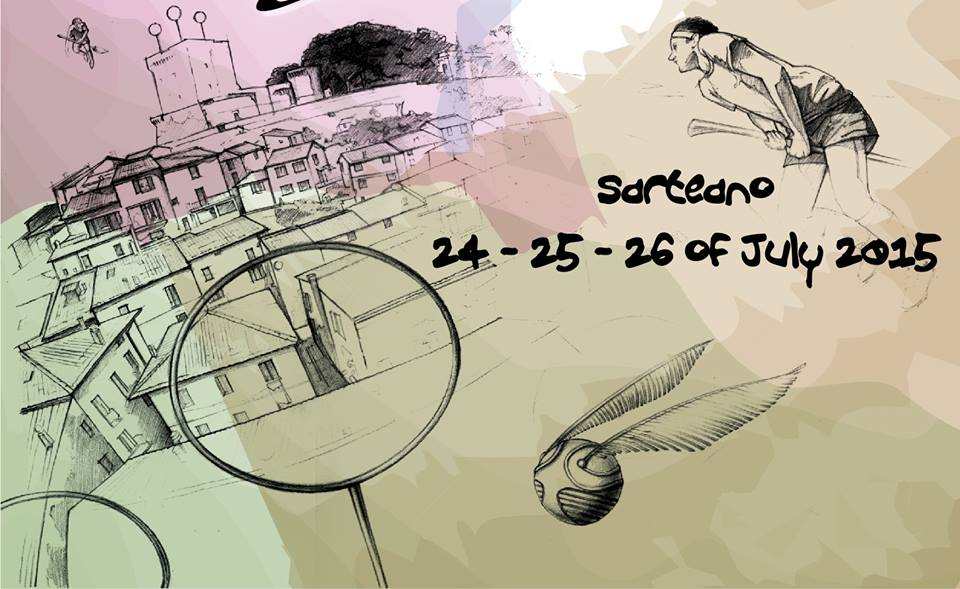- Rule, Britannia, no more?
- Unpopular Opinions: US Quadball Cup 2023
- Proven Contenders: University of Virginia
- Proven Contenders: Rutgers University
- Proven Contenders: University of Michigan
- Proven Contenders: Creighton University
- Different Perspectives: A Look Inside USA Ultimate
- Antwerp QC, Much of Belgian Core, Leaves Competitive Quidditch
The European Games: Why We All Should Be Watching
- By Ethan Sturm
- Updated: July 24, 2015

Credit: Giulio Beligni
The Eighth Man will be present on site at the IQA European Games. Check out our Livestream of the event.*
This weekend, the single most important event of the quidditch summer is taking place. And, while it is international, it is not the MLQ match between the Washington Admirals and the Ottawa Black Bears.
No, the event truly worthy of all of our attention is the IQA European Games in Sarteano, Italy. As the sole international team competition in a non-Global Games summer, it would hold immense value no matter what, but as Europe’s first national team competition since the IQA reformation, and one featuring an unprecedented 12 teams no less, it’s that much more important. So whether you know everything there is to know about European quidditch, or are an American stifling a yawn at this very paragraph, you absolutely need to be fully tuned in this weekend.
Europe’s Time to Shine
Just over a year ago, the International Quidditch Association ceased to exist as we knew it, with most of its personnel infrastructure becoming US Quidditch, its name going to a new organization that provided oversight to international play and countries worldwide forming their own governing bodies. Shortly thereafter, Global Games took place in Burnaby, Canada and highlighted all of the deepest issues that pervaded the old IQA. For the US-centric organization, Global Games was an afterthought, and the planning played out as such. Teams were left scrambling at the last minute to try to attend; the tournament was in dire need of volunteers, medical staff was sparse, and, perhaps most notably, if not most importantly, the film of the event failed to appear, week after insufferable week. Global Games 2014 wasn’t a showcase for the height of our sport; it was a vaguely-organized exhibition.
Come back to the present, and everyone has handled the split differently. The United States continues to turn up their noses to the rest of the world, Australia continues to do its own thing and Canada recently crowned a merc team as its national champion. But no one has responded as well as Europe, which has blossomed since coming out from under the heavy hand of the old IQA. Nothing has exemplified it better than the continent’s European Quidditch Cup, an 11-nation, 32-team international club tournament that played out somewhat similarly to soccer’s UEFA Champions League. While it can be argued that there were some stumbles in its execution, the tournament was the largest ever contested off of United States soil, and, for all intents and purposes, was a roaring success. But, at least for the western hemisphere, it was easy for it to get lost in the whirlwind of spring tournaments, coming just three weeks after Canadian Nationals and one week after World Cup 8.
But with the USQ off for the summer, and zero international play taking play on this side of the world, all eyes will be on Italy to see how well-run the European Games are. While kneejerk reactions might be based on things like film availability, it will be more essential aspects such as issues of referee and snitch competency, timely matches and a workable and well-organized complex that will be the true markers of success. And, based on what we’ve seen from Europe in the past 12 months, there’s no reason to expect anything short of a quality tournament.
Expansion, Expansion, Expansion
To date, seven nations have ever played in a competitive, national team match: the United States, Australia, Canada, France, the United Kingdom, Belgium and Mexico. That number will more than double to 16 by the end of the week, perhaps the clearest sign of the rapid expansion of the sport in Europe.
Amongst the 12 teams competing are long-term powerhouses like France and the United Kingdom, but also nations that barely have a club-team presence like Ireland and Spain–neither of which participated in the European Quidditch Cup in April–and nations that are not even recognized by the European Union like Catalonia.
It’s for these nations with smaller quidditch presences that the European Games can be a turning point. A good experience could lead them to return home, enthusiastically preach the word of quidditch to the masses–to steal a phrase from Alex Benepe–and lead to the development of significant national club leagues with staying power. A bad experience, on the other hand, could lead to deflated passion and a lack of desire to grow the game in their home countries.
This doesn’t mean that they need to be competitive in order for quidditch to succeed in their home countries. In fact, I expect them to get blown out consistently. But it’s about the tournament experience as a whole that will determine the future. Making connections, enjoying the event and being impressed by the spectacle can do the job just as well as playing competitively.
Will one weekend actually make or break quidditch development in a country? Of course not. But its effect will be disproportionately large. So, in order for Europe to continue its unprecedented expansion, European Games needs to be a rampant success not just for the top guns, but to the new kids on the block, as well.
The Anglo-French War
This might not quite be another Hundred Years’ War, but the next chapter in the budding quidditch rivalry between the United Kingdom and France is worth keeping an eye on. These countries have simply never liked each other, be it politics, culture or sports, and as two of the earliest European countries to develop quidditch, the two have found themselves constantly pitted against each other.
France was the stronger team in the early days, and, at the 2012 Global Games–then known as the IQA Summer Games–beat an inexperienced United Kingdom side on its way to a silver-medal finish. No British squads traveled to the 2013 European Quidditch Cup, but the nation responded in a big way in 2014, with the Oxford Chimeras defeating the Paris Phenix in the 2014 Cup finals, 100*-30, and the national team defeating a depleted French side at Global Games, though both nations failed to medal. While it briefly seemed as though the United Kingdom finally had the upper hand, the French once again dispelled those thoughts at the 2015 European Quidditch Cup, with the Paris Titans scoring a decisive finals victory over the Oxford Chimeras, 150*-80, on British soil. It was the Chimeras third loss ever in their home country.
Unsurprisingly, the only two countries to ever put a team in the European Quidditch Cup finals are the co-favorites entering the weekend, and as much as Cinderella stories are fun, it’d be a shame to not see the next chapter in this rivalry play out with a gold medal on the line.
A Global Games Test Run
It doesn’t take a genius to figure out that the 2016 Global Games absolutely needs to be played in Europe. The United States, Australia and Canada are going to travel to the games no matter where they are at this point, while intercontinental travel is probably still too much for Asian and South American nations. And while it would be tempting to put the tournament in Brazil, site of the 2016 Summer Olympics, the boost to South American teams and media coverage probably wouldn’t be able to balance out the loss of European participation. Remember, nine nations are playing this weekend that didn’t field squads at Global Games just one year ago.
So, assuming the new IQA is in fact more competent than the old and returns the Global Games to Europe, this weekend is serving a dual purpose in the lead-up to next year. The first, as I mentioned earlier, is for European quidditch to continue to assert its ability to run major, international quidditch tournaments. Minimizing mistakes, and taking note of the ones that are made and being prepared to fix them, will go a long way in mollifying the rest of the world and convincing us all that we are going to avoid a third consecutive questionably-planned Global Games.
It’s also an important chance for European national teams to grow in a summer when North American and Australian national teams will not even be formed. At Global Games 2014, Europe produced three of the seven participating teams, but none made the medal podium, with the United Kingdom tragically falling, 70*-40, to Canada in the third place game. If the continent is to improve on those results next year, weekend’s like this one are the perfect opportunity to do so.
In truth, European quidditch is best suited currently for international play. Due to the close proximity of its nations, it can host not only events like this one, but regular international team friendlies if it so chooses. This could lead to coherent, stylistically-designed teams, instead of the mish-moshes that have been national teams to this point. It’s also something that leading quidditch nations like the United States and Australia simply don’t have the option to do because of geographical size and isolation.
Quidditch is growing more rapidly in Europe than anywhere in the world, and this weekend’s 12-team tournament is the perfect proof of that. A medal finish for one of its top teams at next year’s Global Games should not even be a goal, but an expectation, and that quest starts on the pitch this weekend.
*Wifi and data restrictions permitting
Related Posts
About Ethan Sturm
Ethan is the co-founder and former managerial editor and chief correspondent of The Eighth Man. When not talking quidditch, which is rare, he can be found drilling people's teeth and spending time with his elusive wife. He's also the worst.



